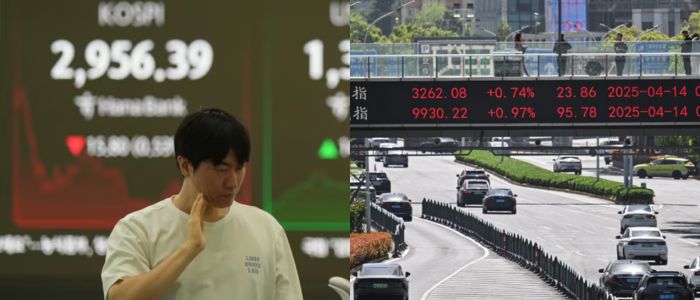Oil prices rose reflecting the worries about possible supply disruptions, and United States futures were down.
In Asia, Tokyo’s Nikkei 225 decreased by 1.0 percent and closed at 38,488.34. Nippon Steel Corp.’s shares gained 2.3% after it finally announced its long-delayed purchase of U.S. Steel after having to resolve resistance from U.S. authorities.
Hong Kong’s Hang Seng Index fell 2.1 percent, to 23,217.07, as tech shares sold off, while the Shanghai Composite dropped 0.8 percent, to 3,362.11.
U.S. Markets Mixed; Fed Signaling Rate Cuts
With U.S. markets closed Thursday for the Juneteenth holiday, investors were reflecting on Wednesday’s mixed finish. The S&P 500 was flat, at 5,980.87, the Dow Jones industrial average dipped 0.1 percent to 42,171.66 and the Nasdaq composite rose 0.1 percent to 19,546.27.
The Fed continued to suggest that it might cut rates twice before the end of 2025, as it had previously projected. There had been a flight to safety following the announcement and the fact that Treasury yields started to hold its gains was a sign of relief, and an unwinding, of the fears around the marketed-impact of Trump’s proposed tariffs on inflation.
Generally, interest rate cuts are viewed as positive for consumers and businesses -- potentially reducing borrowing costs and boosting economic growth. But they also could risk stoking inflation, particularly as oil prices are increasing as a result of the regional conflict.
Oil and Economic Data Show Stress Is Building Globally
Oil markets also reacted to geopolitical risks, with U.S. crude rising 71 cents to $74.21 a barrel. Brent crude gained 76 cents, to $77.46. The gains on Wednesday followed concerns that increasing violence would affect oil exports from Iran and traffic through the critical Strait of Hormuz.
At the same time, economic data in the United States was mixed. New claims for unemployment benefits fell, indicating that the labor market was on an even footing. Yet new home building fell, a sign that higher mortgage rates might be inhibiting the housing market.
In currency trading, the U.S. dollar edged up against the Japanese yen to 145.33 from 145.13. The euro declined to $1.1465 from $1.1484.
Shares wavered after Federal Reserve Chair Jerome Powell said future decisions on rates will be guided by unfolding developments in trade policy and inflation, adding that the economic outlook is still unclear. “There will be smarter and better decisions that we can make if we just wait a couple of months,” he said.
Business

Asian Stocks Drop as Middle East Tensions and Fed Weigh

Asian shares fell Thursday as lingering Middle East tensions and a standoff over U.S. economic policy made for nervous markets. Elevated concerns also followed a veiled threat from former U.S. President Donald Trump over potential U.S. military action in the Israel-Iran fight and a rejection, by Iran’s supreme leader, of U.S. demands for capitulation.















